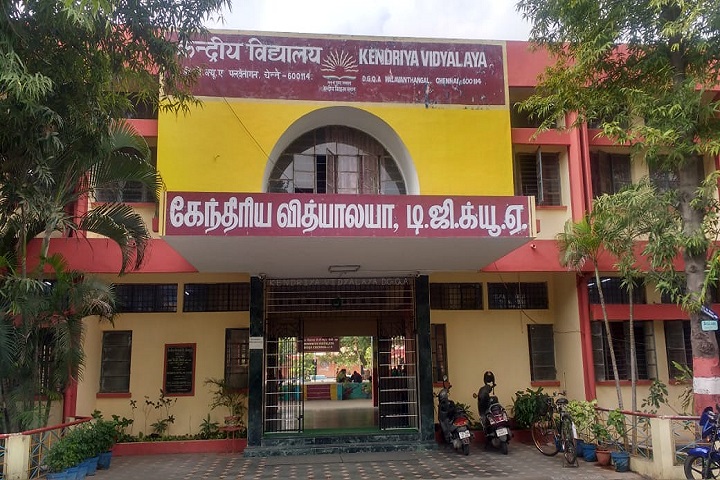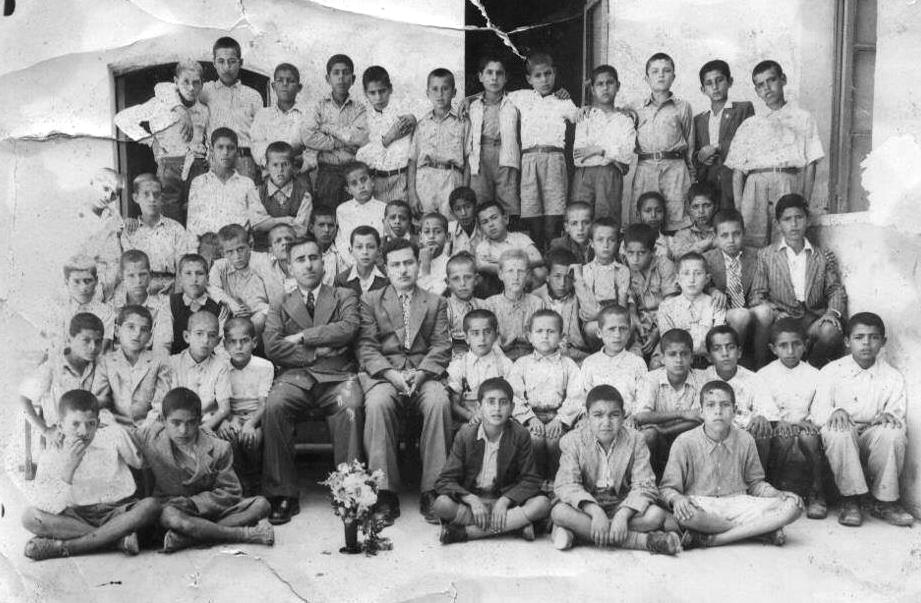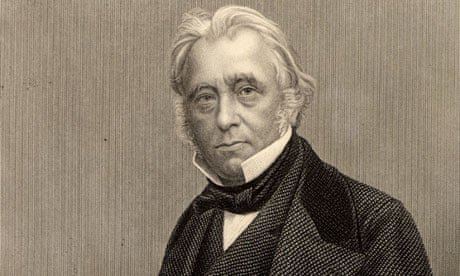
A Kendriya Vidyalaya School in Chennai (Image Courtesy: Careers360)
“I studied Tamil ma’am.” This seemingly innocuous statement poleaxed my new history teacher. I had just completed Class 10 (the Indian equivalent of GCSE) and recently joined the Kendriya Vidyalaya, a system of schools run by the central Ministry of Education, for the final two years of my schooling. My history tutor was shocked because the school did not offer the language I said I studied until the previous year. And it was compulsory to do a language in addition to English in order to be eligible to sit the final exams (A Levels). One might presume that I’d have moved out of Tamil Nadu for high school. I kid you not, I still lived in the heart of Chennai, the capital of the only Tamil-speaking state in the Indian union!
My tutor’s shock plunged in me in a deeper consternation. My peripatetic upbringing had not prepared me to take this unanticipated vicissitude in my stride; one which would go on to profoundly shape my political and social consciousness in the near future. Born in Dindigul, I’ve lived in a number of towns and cities across Tamil Nadu, toured through almost the entire state, heard diverse accents and studied in half a dozen schools. Never have I encountered one school that didn’t teach its students their mother tongue. The widely offered pretext to justify this practice was that the Vidyalaya was a ‘central government school’. Apparently, the ‘centre’ wouldn’t deign to patronise a lowly vernacular.
However, not even my initial dismay at the revelation gave me the strength to handle the practical consequences of this egregious practice. I looked around and saw my peers, who were all as Tamil as I was, finding the greatest difficulty in reading the most basic Tamil letters. It was like seeing a bunch of 18 year old boys brought up their entire life in London unable to read from A to Z. I was crushed. The knowledge of (and literacy in) a classical language with a recorded history of over 2000 years and a rich corpus of literature ranging from the ancient to modern was denied to its native speakers! Even more heart-breaking was that almost nobody except me seemed to care. Not a single teacher felt an ounce of compunction that they were neglecting their duty to pass on to the next generation the most fundamental essence of their identity.
It was paradoxical that they taught us the French novelist Alphonse Daudet’s The Last Lesson in literature classes. In the story, Daudet narrates the distress felt by a school teacher at the annexation of their territory, Alsace-Lorraine, by the German empire in the Franco-Prussian War of 1871. After he receives instructions to stop teaching French to make way for its replacement with German, he walks up to the blackboard and writes “Vive la France” before bidding adieu. My teachers would go over the text with blithe insouciance to its resemblance with our own plight, except that Chennai was not in war. Their indifference was matched only by the carefree benightedness of my friends who were nowhere near realising their pitiful condition. On the contrary, they proactively tried to score well in the language, Hindi, which was thrust down their throats. Maybe they had become inured to it through the passage of time.
The Kendriya Vidyalaya schools were started in 1963 in the same year then Prime Minister Jawaharlal Nehru passed a bill in Parliament giving effect to the continued use of English as an official language. A Harrow and Cambridge-educated Nehru was, unlike his colleagues in the Congress Party, less inclined to impose Hindi on a reluctant populace. But his passing a year later gave leeway for the virulent Hindi-chauvinists to ignore the values of their more enlightened predecessor, leading to the outbreak of widespread anti-Hindi agitations in Tamil Nadu (then Madras State). The gains of this social movement notwithstanding, the centre attempted to impose the language on the state through other, less conspicuous means. The purported founding ideal of the Kendriya Vidyalayas was to educate the children of staff in the Indian Defence Services. Subsequently, the schools were opened to children of employees of other central government-run organisations as well. Their selectivity in picking pupils on the basis of their parents' occupation gave an impression to the outside world that they proffered a standard education which would guarantee a government job in the future. However, on the inside the schools served as the centre's testing ground to nurture a set of students who would become ideologically averse to the ethno-nationalist brand of politics that was enthroned in the seat of political power in the state. A naive population, nescient of this sinister motive, bought into (and still believes in) the 'standard education, government job' myth and aided the growth of the Kendriya Vidyalaya schools. The centre exploited this opportunity and launched into its Hindi-imposition agenda with alacrity. Nowhere is this more conspicuous than in the school's motto which is in Sanskrit, an extinct language modern Hindi derives from. The morning assemblies involve a recitation of Hindu hymns in the same language, which cannot be conceived of as anything less than an affront to the plethora of other Indian languages which still have a large number of speakers. These efforts, however unjust, yielded results to the centre's grand homogenising project. My history teacher herself was a product of one of those schools, who, despite being a Tamil, read or wrote no Tamil. The Kendriya Vidyalayas have, by now, created three generations of Tamils who are illiterate in Tamil. This is true also of other non-Hindi ethnicities in India.
The importance of education in strengthening the national consciousness of a people could hardly be understated. Educating people in their mother tongue forms its most crucial component. A national group disregards it at its own peril. A notable Arab educationist in the British Mandate of Palestine understood this when he said, “We need schools that will instill in students the spirit of freedom, pride, independence, courage, sincerity, and other such principles that can serve to raise nations from the depths of degeneration and enable them to shake off the semblance of servitude they have worn for generations.”

An Arab school in Mandatory Palestine (Image Courtesy: History Boys' School)
His Zionist antagonists understood the value of nationalist learning equally well. Tom Segev, a distinguished Israeli historian, writes in his luminous history of Mandatory Palestine One Palestine, Complete as follows: “... the principal effort to consolidate a separate national identity was reserved for education…(the parents) saw education as a national enterprise. Most schools...made great efforts to imbue the pupils with a deep attachment and sense of belonging to the land of Israel. Lessons on the geography of Palestine were described as ‘homeland’ classes and included many field trips aimed at inculcating Zionist ideology.” He then concludes, “...along with the revival of the Hebrew language, education was Zionism’s greatest accomplishment.”
It is precisely in order to defang such nationalist sentiment of the oppressed that colonisers throughout history have deployed the colonisation of minds as a principal means to ensure the perpetuation of their colonisation of territory. Thomas Macaulay, a hubristic employee of the British East India Company with a characteristic disdain for the Orient, wrote in a minute on Indian Education in 1835; “We must at present do our best to form...a class of persons Indian in blood and colour, but English in tastes, in opinions, in morals and in intellect.” This is characteristic of the coloniser’s intention to deprive the oppressed of a consciousness about their land, history and culture, thereby thwarting the rise of a national awakening which might imperil the position of the oppressor. An understanding of this sinister truth led much of the anti-colonial battle waged through the second half of the 20th century to mobilize as much around cultural rejuvenation as around political emancipation.

Thomas Babington Macaulay (Image Courtesy: The Guardian)
However, the end of colonialism only brought subjugation by a different set of elites to a wide variety of ethnic groups around the world, not least to the Tamils. The Hindi-speaking ruling class in present day India perpetrates the same injustice against India’s myriad other ethnic groups through Kendriya Vidyalayas that the British Raj sought to inflict upon the entire populace. As we saw earlier education can edify and uplift (as in the Zionist example) or oppress and enslave (as in the Raj) a people. But Kendriya Vidyalaya schools not just try to enslave ostensibly independent peoples but they attempt to keep them perpetually ignorant of their woeful predicament. The apathy that characterised the disposition of my teachers and peers towards their plight demonstrates that the project is not without success.
Stop Oppressing Thamizh Language in Kendriya Vidhyalaya! Else Language War will Erupt Again in Thamizh Nadu!
— ???? ?????? ????? (@NaamTamilarOrg) February 10, 2021
- Seeman https://t.co/vrcHYkalQG#KendriyaVidyalaya | #Tamil | #Hindi pic.twitter.com/LFVV5IYMU4
This is perhaps why I find a recent statement released by Naam Tamilar Katchi (NTK) leader Seeman remarkably gratifying. The title reads, “Stop Tamil Language Oppression in Kendriya Vidyalaya! Else Language War Will Erupt Again!!” Finally, at long last, a politician voices his concern about a pressing cause long neglected by the establishment parties. Certain lines in the statement feel like they were ripped straight out of my personal experiences. Particularly, the sentence “...and writing letters in Hindi to Tamizh authorities are all part of the Centre’s defamatory actions…” spoke to me personally. In my Class 12 Board Exams (A Levels), I scored marks surpassing the highest in the history of the school, ranking amongst the top three in the country. Several months later whilst I was in college, I received an email from my school principal (a Tamil herself) written completely in Hindi. I called my school to find out what it said. I was told that I had been selected for the Dr. Ambedkar Scholarship awarded by the Ministry of Social Justice and Empowerment. Apparently, even though I was eligible for such a rare honour, I wasn’t entitled to receive the communication in my native tongue.
Seeman’s reference to the language war is also telling particularly with regards to the current political scenario in Tamil Nadu. The last major anti-Hindi agitation took place in 1965 when the centre attempted to impose Hindi forcibly on the entire nation. The massive protests in Madras State, as Tamil Nadu was then known, jolted Delhi and ensured that Tamil Nadu retained its linguistic autonomy. It also catapulted the Dravida Munnetra Kazhagam (DMK) into political dominance over the state. But, over the 55 years that have passed since the agitation, the Dravidian parties have done little to protect Tamil language or fight alien colonisation of Tamil lands. If anything, they have only allowed the proliferation of Kendriya Vidyalayas across the state. The dynamism and ebullience that characterised the DMK in its initial stages is all but lost amongst its current cadres. More worryingly, something especially lacking in them is genuine commitment to accord Tamil its rightful status and safeguard the rights of Tamils in the state. After all these years, it has come down to a relatively new party to express so much as a denunciation of the state-sanctioned decay of Tamil language and culture. The establishment has more important things to take care of, perhaps.
????????? ????????? ???????????? ????????? ???????????? ???????? ???????? ???????? ???????? ???????? ?????? ???? ?????????? ????????? ??? ????????!
— ?????? (@SeemanOfficial) February 9, 2021
????? ??????????? ???????? ????????? ?????? ????? ???? ???? ??????? ???????????? ???????? ????????!https://t.co/SbPdbrbZz2 pic.twitter.com/vGx6o8ALbK
In another statement, Seeman condemned the boycott of Tamils for employment in an industry run by the central government. Out of 1500 candidates selected for interview to fill 269 vacancies at the Neyveli Lignite Corporation, located in Cuddalore, only eight candidates were ethnically Tamil. Numerous such iniquities and invidious discriminations are meted out on a daily basis. But the establishment continues to turn a blind eye. It won’t be a stretch to compare the Dravidian parties to the venal and incompetent leadership in the West Bank. Just like the Palestinian National Authority (PNA) is mired in its internal disputes, unable to curb the growing Israeli settlements in the occupied West Bank, the establishment parties in Tamil Nadu are focused on filling their coffers and perpetuating their proximity to power, even as the Tamil homeland is being colonised rapidly, Tamil people increasingly unable to enjoy their national life and the Tamil language deteriorating precipitously. It’s time for some fresh blood to take the reins!
